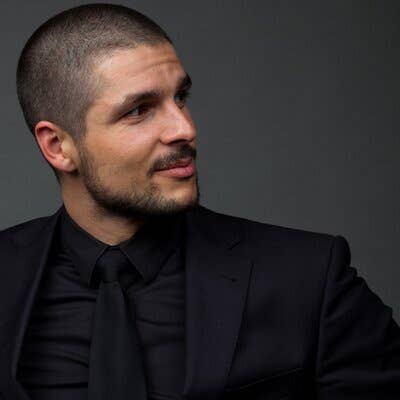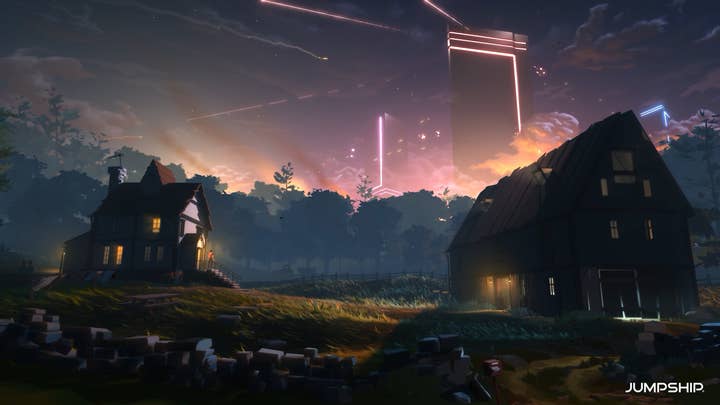Dino Patti: "If you get what you expected, it always gets boring"
Former Playdead CEO talks about his new studio Jumpship, and why Chinese gaming giant NetEase is interested in his latest subversive indie title
After ten years with Playdead, studio CEO and co-founder Dino Patti sold his shares in the company and left to "seek new challenges."
Along with his partner Arnt Jensen, the pair created both the critically acclaimed Limbo and Inside, establishing themselves as one of the leading creative forces in the realm of provocative and disturbing indie games.
In July 2017, Patti announced he was opening a UK-based studio to work on a new project, Somerville, founded in partnership with the game's creative lead Chris Olsen.
With a legacy of genre-defining work behind him, Patti's new project has a lot to live up to, and he says he wants to continue pushing the definition of what a game can be, subverting player expectations.
"We have several concepts we work with, but one of them is we try to break genres," says Patti. "I really hate trying to describe a game, and people advice you to just find two words, like FPS horror, or whatever.

"I really hate that because it puts your game in a box, and often an uninteresting box. So we kind of tried to break some genres, even like whenever our players think they know what genre it is, we try to change it up."
Not unreasonably, Patti almost laughs at the suggestion it could be something as straightforward as a point-and-click adventure. His previous game Inside wasn't just a platformer: yes, the player progressed through the game by jumping and solving puzzles, but the wordless dystopian tale made it something more. The ending that sees you staring out on a lake, free but ultimately doomed, asks the player what price they're willing to pay for freedom.
"If you get what you expected, it always gets boring," says Patti of Inside's disturbing denouement. "Usually when I play games, if I play three hours and after that I can extrapolate the next ten, I get really bored. So that's why we do it. We don't want people to extrapolate anything, everything should be a surprise."
Somerville sees Patti occupy a less creative role, however, instead stepping aside to help realise the vision of his collaborator Chris Olsen. An animator formally working in the film industry, this is Olsen's first game, but it was his clear creative vision that attracted Patti to the project, and sees him taking more of a design and facilitator role.
"With Jumpship, I drive a lot of the concepts but all of the creative power is my partner's with this title," says Patti. "It's his vision."
While details are light on Somerville, the imagery of quaint farmhouses set against the backdrop of looming alien monoliths is a distinctly dystopian one.
"He's just super talented, and he does everything; the concepts I push around this don't conflict with the direction he pushes," says Patti. "So a lot of the things I push for, the gameplay and so on, isn't in conflict with what he wants with the creative story."
Chinese gaming giant NetEase recently made the surprise announcement that it had acquired a minority stake in Jumpship, along with investing thatgamecompany and Second Dinner. While often playing second fiddle to Tencent in China, NetEase was still the seventh highest grossing public gaming company in the world last year. It's an empire built primarily on mobile and free-to-play, and its recent investment in artistic indie companies represents a slight change of tact.
Jumpship and NetEase certainly seem like a curious pairing. However, Patti stresses -- within earshot of his NetEase colleague -- that the gaming giant is a quality-first partner, rather than a profit-first one. NetEase was one of more than 15 companies Jumpship met with looking for funding, and Patti says "we just kept having good experiences with them."
"I really hate that because it puts your game in a box, and often an uninteresting box"
"We had one specific contact who we dealt with the most, and he understood the game, he played our vertical slice a lot of times, he had the right questions," Patti adds. "We had a call with his boss and I thought, 'Okay, now it gets corporate' but he only talked about quality in games.
"We were like, 'Okay, that's what we wanted to hear'. All of the people we met asked the right questions and talked about the right things that we cared about. So we weren't so much concerned going in. It seems like an odd couple, but that's maybe because you haven't talked to the people we have."
As a market, China isn't necessarily receptive to narrative-driven premium indie games. However, as Patti notes, the market is so large, that even a fraction of that is worth tapping, and NetEase is the perfect partner to help with this. However, Jumpship still hasn't settled on a Western partner, or even which platforms Somerville will be arriving on. Despite the considerable success many indie developers are finding on the Switch, Patti was reluctant to commit to the idea.
"When you talk about console and PC, you start to talk about generations, and the gaming industry changes so fast," he concludes. "One of the first questions I get is people ask what console it's coming, and it's so weird because why should we chose that as the first thing?
"We make the game, and we look at the landscape, and if there is a good deal we sign it. But most of all we are looking at what new consoles are out there and what channels, like the Google Stadia. But in two years' time there is something else, so I really want to keep that open as long as possible, and then select it at the right time."


